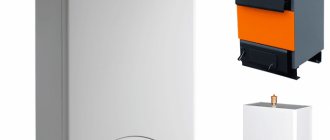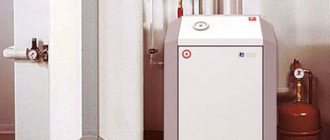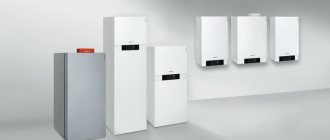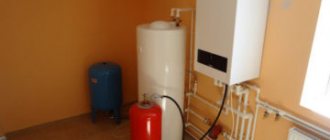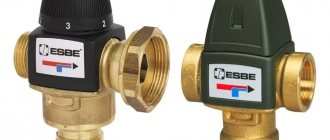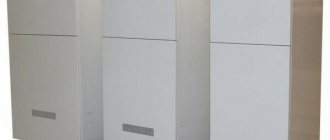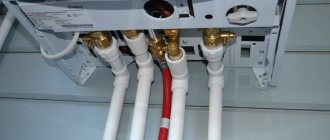Certification of boilers is mandatory and is carried out in the form of a TR CU certificate or a TR CU declaration. Boilers are used in production, at home and in everyday life, especially in demand is the issuance of a certificate of conformity for gas boilers for heating, steam boilers, boilers operating on liquid and gaseous fuels, as well as obtaining a certificate for hot water and electric boilers.
According to the type of fuel used, heating boilers are divided into: solid fuel (wood, peat, pellets, coal, coke), liquid fuel (diesel, fuel oil), gas (methane or propane-butane), electric (electrode, heating elements, induction) and combined (more one type of energy carrier).
TR TS 032 defines the concepts of such devices as: waste heat boiler, energy technology boiler, electrode boiler, electrically heated boiler, water heating boiler, steam boiler.
Certification of boilers operating on liquid and solid fuels (TN VED 8403 10) is carried out in accordance with the requirements of TR CU 010/2011 “On the safety of machinery and equipment”.
For boilers operating on gas, the regulation TR CU 016/2011 “On the safety of devices operating on gaseous fuel” is applied.
A special category of boilers are steam generators and boiler rooms, the operation of which is associated with the presence of high pressure in the circuit. There is a separate regulatory act for them - TR CU 032/2013 “On the safety of equipment operating under excess pressure.
Each regulation imposes its own requirements for the design and characteristics of boilers, and also establishes rules for confirming compliance with these requirements. You can obtain a certificate or declaration for boilers at our certification center.
Safety requirements for boilers
Most types of boilers are subject to technical regulation of the Customs Union, where uniform safety requirements are approved throughout the territory of the member countries of the association.
The main documents of the system are the technical regulations of the Customs Union (TR CU). In particular, the following regulations apply to boilers:
- TR TS 010/2011 “On the safety of machinery and equipment”;
- TR TS 004/2011 “On the safety of low-voltage equipment”;
- TR CU 020/2011 “Electromagnetic compatibility of technical equipment”;
- TR CU 016/2011 “On the safety of devices operating on gaseous fuel”;
- TR TS 032/2013 “On the safety of equipment operating under excess pressure.”
Advantages of ZhMZ products
Any of the ZhMZ gas devices can operate independently of electrical networks - this allows you to expand the scope of their application. Advantages:
- Designed for the harsh Russian climate. Adapted to changes in water and pressure. Hardy, powerful, reliable, unpretentious.
- Can operate at very low pressure in gas and water supply systems.
- In severe frosts, they will ensure a comfortable temperature in the house.
- Highly reliable automation ensures high productivity of each unit and safe operation of all systems.
- Service life - 14 years or more. Warranty - 36 months.
- Capable of heating large areas.
- Some modifications can switch to liquefied gas.
Registration of a certificate for boilers
Standards used to confirm the compliance of heating boilers using liquid and solid fuels:
GOST EN303-1-2013, GOST EN 303-2-2013, GOST EN 303-4-2013, GOST EN 14394-2013, GOST R 51382-2011 (EN 303-4:1999), section 5 GOST R 54440-2011 (EN 303-1:1999), section 5 GOST R 54441-2011 (EN 303-2:1998), section 8 GOST R 54829-2011 (EN 14394:2005 +A1:2008), ST RK EN 15034-2013, STB EN 303-1-2010, STB EN 303-2-2010, section 4 STB EN 15034-2013, sections 7 and 8 GOST 30735-2001, GOST 10617-83, sections 5 and 6 GOST 20548-87.
To obtain a certificate for electric boilers, it is necessary to comply with the requirements of both TR CU for low-voltage equipment (TR CU 004) and their electromagnetic compatibility (TR CU 020).
Electric cooking boilers for domestic use are subject to mandatory certification in accordance with the requirements of TR TS 004/2011 “On the safety of low-voltage equipment” and TR TS 020/2011 “Electromagnetic compatibility of technical equipment”. Standard used to confirm compliance of electric digesters: GOST IEC 60335-2-47-2012.
A certificate of conformity must also be issued for gas boilers; they fall within the scope of regulation of TR CU 016/2011 “On the safety of devices operating on gaseous fuel”, such boilers include:
- heating gas boilers with heating capacity up to 100 kW (HS 8403 10);
- heating gas boilers with a heating capacity of over 100 kW (TN VED 8403 10);
- thermal gas stationary digester boilers for catering establishments and catering units, etc. (HS 8419 81 800 9).
Gas-fired steam boilers with a steam pressure of more than 0.07 MPa and water-heating boilers with a water temperature of more than 115 ° C are not subject to TR CU 016/2011 “On the safety of apparatus operating on gaseous fuel.”
Standards used to confirm compliance of gas heating boilers: GOST EN 303-3-2013, STB EN 297-2010, sections 4 and 6
STB EN 303-7-2010, STB EN 483-2010, STB EN 656-2012, sections 4, 5 and 7
STB EN 677-2000, STB EN 13836-2010, GOST 12.2.096-83, sections 1 – 3
GOST 20548-87, sections 4 and 5 GOST 30735-2001, section 4 GOST R 51733-2001, sections 4 – 6 and 8, GOST R 53634-2009 (EN 656:1999), sections 4 and 5
GOST R 54438-2011 (EN 625:1996), sections 5 – 8 GOST R 54439-2011 (EN 13836:2006), sections 4, 6 and 7 GOST R 54440-2011 (EN 303-1:1999), sections 4 , 5 and 7 GOST R 54444-2011 (EN 303-7:2006), sections 4, 5 and 7 GOST R 54825-2011 (EN 677:1998), sections 4 – 6 and 8 GOST R 54826-2011 (EN 483 :1999), sections 5 – 7 GOST R 54829-2011 (EN 14394:2005+ A1:2008)
Standards used to confirm compliance of stationary cooking boilers: sections 2 and 4 GOST 27441-87 (ST SEV 5796-86), sections 6 and 7 GOST R 55211-2012 (EN 203-1:2005), sections 6 and 7 GOST R 55214-2012 (EN 203-2-3:2005), sections 6 and 7 GOST R 55220-2012 (EN 203-2-11:2006), ST RK IEC 60335-2-102-2012.
Steam boilers with a steam pressure of more than 0.05 MPa and hot water boilers designed to produce hot water with a temperature of more than 110 C (TN VED 8402, 8403 10) are subject to certification according to the requirements of TR CU 032/2013 “On the safety of equipment operating under excess pressure."
The categories of steam, hot water boilers and fire-heated vessels are indicated in Table 5 from Appendix 1 to TR CU 032/2013.
Compliance with the requirements of the regulations is achieved by using the following standards:
GOST 3619-89, GOST 10617-83, GOST 24005-80, GOST 25365-82, GOST
25720-83, GOST 30735-2001, GOST 12.2.096-83, GOST 3619-89, GOST 10617-83, GOST 22161-76, GOST 24005-80, GOST 24569-81, GOST
25365-82, GOST 21563-93, GOST 28269-89.
Purpose and operating principle of a gas solenoid valve
An electromagnetic gas valve is a device that allows you to regulate the supply of natural gas automatically.
With such devices, the use of natural gas is safer.
If a leak occurs, the solenoid valve for the gas boiler will automatically shut off the pipeline as soon as possible and will not allow toxins, which are very dangerous substances for humans, to enter the room.
After the valve relay begins to supply electricity to the coil, the armature is retracted and begins to lift the plunger, thus allowing free access of gas to the working environment.
After the voltage is turned off, the plunger returns to its original position and closes the channel between the inlet and outlet fittings, thereby preventing the flow of gas. The main purpose of such a device is to distribute and regulate the gas supply in pipelines, boilers, dispensers and other devices.
Registration of a declaration for boilers
For boilers operating on liquid and gaseous fuels, confirmation of compliance occurs in the form of a declaration of conformity in accordance with the requirements of TR CU 016/2011 “On the safety of machinery and equipment”.
The declaration is issued in relation to heating boilers operating on liquid and solid fuels with the HS code 8403 10.
For example: with natural or forced combustion air supply, manual or automatic fuel loading;
equipped with forced-air burners for liquid fuel (balanced draft boilers, pressurized boilers);
condensing boilers supplied complete with a spray burner.
It should be noted that the subject of conformity assessment is the entire assembly, together with the injector and fuel fittings (for liquid fuel installations). In addition, installations of the 1st and 2nd hazard groups operating under high pressure are also declared (TR TS 032/2013).
Which document to issue for boilers depends on the hazard category to which they belong. For categories 1 and 2, as a rule, a Customs Union declaration is issued, and for categories 3 and 4, a Customs Union certificate is issued.
Ignition transformer
This element supplies the burner with a current discharge (spark), which is necessary to ignite the fuel. In addition to other elements that directly affect the operation of the unit, the component can also fail. As a result, all automation will work, but fire will not appear, since there is no source of ignition.
How can you quickly check the ignition transformer of a gas boiler for functionality? Just. You need to make a few simple movements:
- Through a special window, see whether the discharge is going on or not.
- Using a tester, check the voltage coming out of the controller during the ignition attempt. A figure falling within the range from 187 to 235V is considered normal.
- If a problem is detected, you need to disconnect the power from the transformer and connect it back.
- Check again.
Any gas boiler is equipped with many safety elements and sensors that allow you to monitor the correct operation of the unit. In the event of situations that clearly threaten human life, the system completely shuts down the installation.
In case of any breakdown, most owners of a gas water heater call a specialized service technician. However, services usually come with financial costs, right?
Boiler certification and declaration schemes
Mandatory certification of boilers operating on gaseous fuel, as well as electric boilers, is carried out according to one of the standard schemes adopted in the Customs Union:
1с - for a series of equipment;
3с - for a batch of equipment;
4c - for single equipment.
A certificate of conformity is issued only after full verification that the manufactured boilers meet the safety requirements of technical regulations, the presence of markings, and operational documentation.
At the same time, two CU TRs apply to electric boilers (on low-voltage equipment and electromagnetic compatibility), so a certificate can only be obtained if the requirements of both documents are met.
The Declaration of Conformity is accepted according to the following declaration schemes, depending on the boiler production conditions:
serial production - 1d, 3d or 6d; batch - 2d or 4d.
About company
Before the Great Patriotic War, the Zhukovsky Machine-Building Plant produced a variety of metal structures, and in the post-war period, equipment for aviation maintenance. It still produces similar equipment for the domestic and foreign markets.
The company also produces heating equipment. Today, over 30 options are produced with a power from 11 to 68 kW. The most popular modification of the Zhukovsky MZ is the AOGV boiler. The remaining series - AKGV and KOV - are in demand among Russian consumers. The company has diplomas and distinctions for the high quality of its products.
Documents required for boiler certification
To start the boiler certification procedure, you will need to submit an application to the certification center, with which you must submit a set of documents containing the following content:
- details of the applicant or manufacturer;
- technical information on which the installation was carried out;
- description of the boiler indicating technical characteristics;
- equipment passport (for boilers operating under high pressure);
- operational manual;
- invoice (for an imported boiler);
- certificates or results of examinations carried out outside the scope of boiler certification according to technical regulations.
will provide assistance in obtaining certificates for various boilers for domestic and industrial use, as well as registering declarations of conformity of such equipment. Our experts will carry out all the necessary checks to establish the safety level of your boilers in a short time.
If you have any questions about the boiler certification procedure, you can contact our specialists for advice by writing to us at [email protected] or calling us or making an online application.
Good boiler.
They staged Prometheus 16. The boiler has been running for three seasons now. Burns great, warms up the whole house within 40 minutes.
Before this, all the relatives put it up. Initially I doubted whether it was worth taking it. The price was confusing. After watching the combustion process with relatives, I finally decided to do it.
Three times more economical than the old one. In the morning the coal fell asleep and was forgotten until the evening. The temperature in the house is 26 degrees around the clock.
Subsequently, friends and acquaintances also installed me after me. The only thing that’s a little annoying about the boiler is the cleaning process. And it was annoying at first, until through trial and error I came up with my own device for cleaning a cat.
Now everything is fine. By the way, the boiler needs a constant flow of air, it loves it very much, so I installed a ventilation window for it. And a pipe 150 mm 9 meters.
Design Features
- Fire adjustment is made in two ways: automatically and manually. The models differ not only in power, each of them has a certain range of capabilities.
- Some models have a pump to circulate water in the pipes. This allows you to effectively heat the room due to uniform heat distribution. Cheaper modifications do not have pumps, and water circulates according to the laws of physics. Therefore, when installing such boilers, the pipes are mounted at an angle.
- All modifications have an expansion tank. It allows you to achieve optimal pressure in the system, and if the liquid expands due to strong heating, it stores its excess.
Varieties
All boilers at the Zhukovsky Plant are floor-standing. There are three modifications:
- "Economy";
- "Universal";
- "Comfort".
In the first case, automation manufactured in the Russian Federation was used, in the other two - foreign ones. The brand presents only single-circuit versions - for heating buildings; double-circuit versions are not produced at ZhMZ.
Device
The efficiency of the equipment is 89%, which is quite good for domestic products. This productivity can be achieved due to the original design of the heat exchanger. The cast iron heat exchanger is equipped with turbulators. The burner is atmospheric, air comes from the room. Thanks to automation, continuous operation for a long time is ensured.
Heaters from the Zhukovsky Plant have a number of innovations that increase their environmental friendliness. Developers are trying to keep up with global trends, but still, domestic products are far from achieving the indicators of European and some Asian competitors. But Russian products have an undeniable advantage - a low price that satisfies all consumers.
